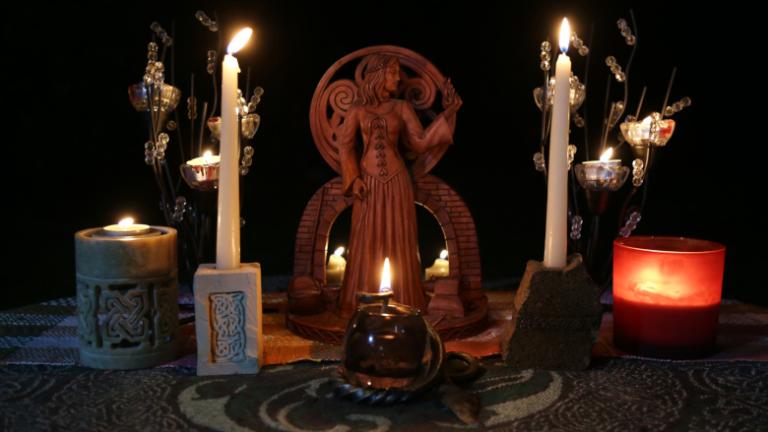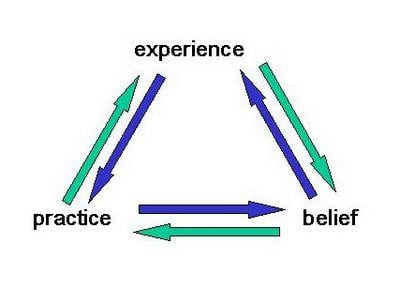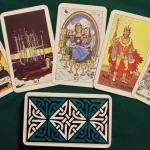What is religion? Ask the typical American and odds are good you’ll get something that talks about believing. It may be couched in terms like “faith” or “accepting” or “conversion” but at the end of the day, most contemporary Westerners’ idea of religion is which set of supernatural propositions you affirm and which ones you reject.
For most people throughout most of the world throughout most of history, belief was relatively unimportant. What mattered most – and what still matters most to many – is who you are, whose you are, and what you do.
It is that third part – what you do – that I’d like to discuss in this post.
I hate to begin with a disclaimer, but in this case it’s necessary. As regular readers of this blog know (but others may not) Paganism isn’t one religion. It’s a Big Tent of many religions. Still, the vast majority of these religions (that I know of, anyway) would agree that while what we believe plays a role in our religious lives, it’s what we do that matters most.
Practice: the things we do on a regular basis
At an early age we’re taught the importance of cultivating good habits. What are considered “good habits” vs. “bad habits” is often a matter of cultural preferences. I prefer to say “helpful habits” vs. “unhelpful habits.”
What deepens your relationships with your family, your community, and the world at large? What motivates you to do the things you need to do to build a successful life – however you define success? What gives you the strength to deal with the challenges and adversities of life?
Some of this falls under the category of spiritual practice: prayer, mediation, making offerings, and such. I talk about these practices – these habits – a lot, because they really are that important. But practice is also how we go about the mundane activities in our lives: how we eat, how we exercise, and how we care for – and celebrate – our bodies. It’s how we make a living, and it’s especially how we interact with other people as we do.
I cringe when I see ads for “Christian exercise plans” and similar religious branding. I would hate to see Pagans go down that road… anymore than we already have, anyway. At the same time, I hope our practices – all our practices – are of the helpful variety and not the unhelpful.
Honoring the Gods – whatever you think They are
Not all Pagans are polytheists. Not all Pagans are theists of any variety. But when we come to an Imbolc circle (at least any Imbolc circle I’ve had a part in planning) we honor Brighid. We say prayers, we make offerings, we speak words of praise in poem and in song. We honor Brighid.
We don’t tell you what you have to believe about Brighid.
Are you honoring the Irish Goddess of poetry, smithcraft and healing? Great – so am I. Are you honoring the Christian saint who may be the Goddess in another form, or who may be a human woman? Fine – you’re in good company. Perhaps you’re honoring The Goddess in one of Her many aspects. I don’t see it that way, but who knows – you might be right. Maybe you don’t believe in Goddesses or saints and you just want to celebrate the personification of poetry, smithcraft, and healing. That’s a worthy activity.
Honoring Brighid is what makes you a part of our community-for-an-hour. What you believe about Brighid is between you and Her.

Embodying virtues
What makes us Pagans is not believing Pagan things but doing Pagan things. And at the top of that list is embodying Pagan virtues.
Reciprocity is perhaps the greatest of Pagan virtues: “I give so that you may give so that I may give again.” Our Gods give us Their blessings so we make offerings to them. We can never pay them back, but we don’t have to. We simply return a gift for a gift. We practice reciprocity in our ordinary lives by dealing honestly and fairly with those we come across: we pay a fair price for a fair product or service. When we are the provider, we charge a price that reflects a fair exchange, neither exploiting vulnerable people nor undervaluing our own labor and expertise. We give freely where it’s needed, and where we can.
If reciprocity is Pagan Virtue 1, hospitality is Pagan Virtue 1a. We greet the guests at our rituals and we do our best to make them feel at home. We make offerings to our spiritual guests to show our respect for them. And we do the same in our daily lives. In ancient times, where travel was slow and hazardous and public accommodations were few and far between, turning a stranger away from your door was the equivalent of saying “I don’t care if you live or die.” And so began the laws of hospitality, making clear the obligations of both hosts and guests.
There are many other virtues. Sometimes our virtues are in conflict, as anyone who’s ever tried to be both honest and kind understands. We have few hard rules to tell us which is more important – we have to work though the situation and figure it out for ourselves.
What we think are virtues is important. What’s more important is how we embody those virtues – how we live them out in our lives.
Practice leads to experience, experience leads to belief
Spiritual experiences cannot be commanded, but regular spiritual practice makes them more likely. When we have spiritual experiences, we interpret them – that leads to beliefs about them. Because we have beliefs, we continue practicing. That leads to more experiences, on and on in a virtuous circle of practice, experience, and belief.
I wrote about this some years ago and I said that this circle can go in either direction, and you can start at any point. While I still think that’s true, in most cases we begin with practice.
Other religions may disagree, but I see no virtue in ungrounded belief. Our religious traditions are a starting point, but we start by doing. We need faith only to the extent that we trust that there’s something of value in our Pagan traditions – something that makes it worth our time. We take action and begin practicing. Once we do, the benefits of good habits start to make themselves obvious to us, and we continue them.
Or they don’t. In that case, we realize our true calling is somewhere else. Paganism is a wonderful path, but it’s not for everyone.
The primacy of practice in the socio-political sphere
I doubt anything I’ve written so far will be of any surprise to anyone even on the edges of the Big Tent of Paganism. But I suspect many haven’t taken the primacy of practice to this point. I hope you’ll give it some serious consideration. And since this topic can be sensitive, I’ll use myself as an example.
I don’t care what anyone believes about my Pagan and polytheist religion. I hope they’ll see how it has been and remains good and beneficial for me and will come to the conclusion that it’s a good thing, even if it’s not for them. But if they’re so invested in a religion that teaches otherwise, so be it. If you think I’m going to hell, I don’t care. We can still be friends.
But the moment you shift from disagreeing with my religion to attacking my religion, we can no longer be friends. Start causing problems for me and my co-religionists and we’re going to be enemies. What you believe – what you think – doesn’t matter to me. What you do matters very much.
Extend that to any other group in any other context and the principle is the same. What you believe about other people is your business. What you do to other people – directly or indirectly – is everyone’s business.
I hope for acceptance. I demand tolerance.
Paganism is a religion of doing
When I first started on this path about 30 years ago, I heard “orthopraxy not orthodoxy.” Right action, not right belief. I don’t hear that much anymore, I think largely because we realized we don’t agree on what right action should be.
That’s OK. Our traditions are sacred and our virtues are timeless, but how we embody and express them is something every generation of every movement has to continually review and revise. A healthy religion is a living religion, and all living things grow and change.
What doesn’t change is that our beliefs don’t make us good people.
Our actions do.




















